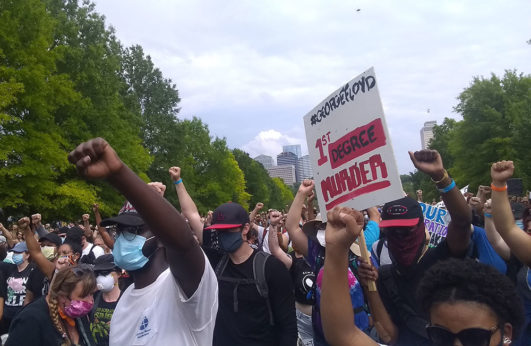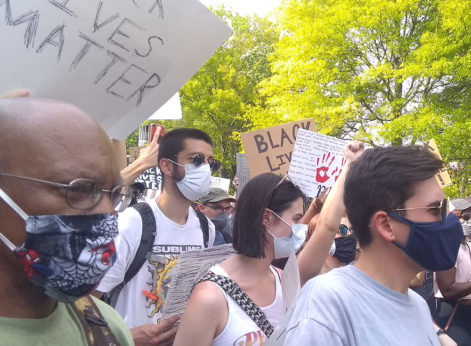
NASHVILLE—A huge gathering of protesters—led by students—congregated at the Bicentennial Capitol Mall State Park in downtown Nashville the evening of Thursday, June 4, to protest the horrific murder of George Floyd and the overall issue of racist police violence. The Bicentennial Mall Park is composed of 19 mostly grassy acres with plaques commemorating area history from ancient Indigenous times to the 20th Century.

By the estimates of local media, the marchers numbered over 10,000, while the count taken by community observers put the total at over 20,000. From within the midst of the gathering, neither the beginning nor the end of the protest crowd could be seen. Most demonstrators wore masks on the miles-long march through the city in brutal, searing heat. Helicopters continually loomed overhead.
The protest was organized by five teens: Nya Collins, Jade Fuller, Kennedy Green, Zee Thomas, and Emma Rose Smith. They are all ages 14 to 16, four African American and one white, and all female. They organized under the name Teens for Equality. They led the region’s largest protest against racism perhaps in Nashville history and certainly the largest ever against racist police violence. Indeed, it was arguably the largest march for justice in the history of the city. The teens, who organized the march via social media, expected no more than about 200 to attend.
The gathering was well organized with masks, hand sanitizers, water, candy bars, and snacks, and Gatorade available to the marchers. There was even a phone number provided for bail for anyone who might get arrested. It was a peaceful rally, though, with no incidents. On this occasion, police were far from confrontational and were actually cooperative. They blocked intersections for the convenience of the marchers, and the protesters were followed by a contingent of officers—less than ten—on bicycles.
At certain downtown intersections, the marchers blocked the streets with “rolling blockades” of demonstrators lying on their stomachs and shouting “I can’t breathe,” indicating the manner of the barbaric execution of George Floyd.

The march was youth-dominated, with all ages, races, creeds, and colors represented.
The march, after short speeches by teen speakers, wound its way through the downtown area with loud chants, including: “No Justice, No Peace,” “Hands Up, Don’t Shoot,” and “Say his name, George Floyd.”
Marchers carried signs with even more diverse messaging: “White Silence = Consent,” “Black Lives Matter,” “ Silence = Violence,” “ Will My Brother Be Next ?” and “Defund, Disarm, Disband the Police.”
The protesters returned to their starting point, the Bicentennial Mall Park. after a couple of hours of marching that included a short stop at the State Capitol. Dialogue continued at the Mall Park as the huge crowd split into smaller groups to contemplate further actions.
This was the third mass protest for Nashville following in the wake of rallies held May 30 and June 1. That the huge protest ended without any incidents or arrests was felt by all involved as an example in the right of the people to peacefully assemble and express their grievances that should be observed by police departments around the nation.












Comments